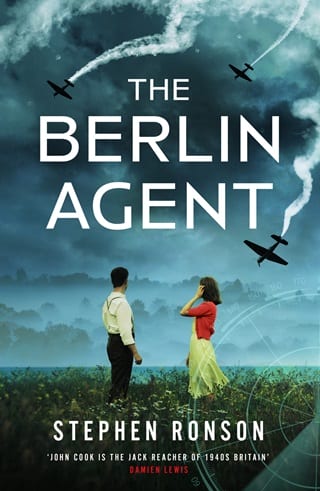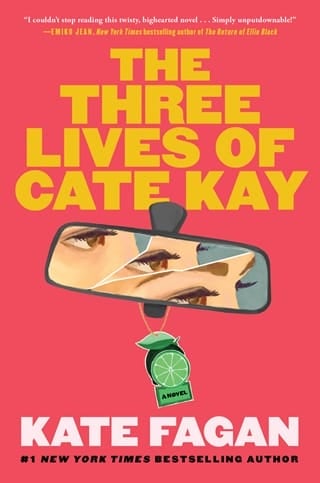7
The air-raid siren carried across the fields.
‘One raider, south by south-east.’
The watcher replaced the handset on her field telephone. She was a young woman, barely out of school, but she seemed to know what she was doing. Her partner, another efficient young woman, put down her mug of tea and scanned the sky to the south.
I’d written to the War Office during winter and offered a corner of my land for an anti-aircraft emplacement. An unworkable corner, filled with sandstone outcrops. There’d been months of silence after my letter, and I’d forgotten about it. Then, out of the blue, a ten-tonne lorry had rumbled down the lane, towing a 40 mm Bofors gun, its seven-foot barrel still glistening with packing grease. State of the art for bringing down enemy planes. The only problem was, the Germans had as many as we did. Bofors, the Swedish manufacturer, was doing a roaring trade selling them to both sides.
‘You should go,’ the watcher said. ‘Take care of your people.’ She picked up her binoculars. There was enough light left in the sky for her to scan the southern horizon, where the South Downs loomed. Her partner, the gunner, hefted a four-round clip of shells and loaded them into the gun. She took her seat and powered up the sighting mechanism.
‘It’s going to be a full moon,’ I said. ‘I doubt the Germans will want to drop their best and brightest on a night when any idiot with a gun can pick them off. If I were them I’d wait for a dark night.’
‘Would you want a clear sky or clouds?’ the watcher asked. ‘If you were going in?’
‘I’d go by boat for a start,’ I said. ‘I’m too old to start throwing myself out of an aeroplane.’
‘Clouds would be better for the safety of the pilot and the plane,’ she said. ‘Not much chance of being shot down if they don’t know you’re there. But it would be useless if you wanted to drop your people in a specific place. You wouldn’t be able to navigate unless you had incredibly accurate bearing and distance. Even then, you’d probably drop them miles from where you wanted them.
‘I’d do it on a clear night, but no moon,’ she continued. ‘You’d want someone on the ground with some kind of -signal so you could drop your men in the right place.’
It sounded like she’d been thinking it through. Strange times, when a young woman was sent out to watch for invaders, and even to contemplate mounting a counter-attack.
‘Maisie, I’m sure Mr Cook’s got places to be,’ her partner said. Quite right. We’d let our guard down.
We listened to the noises of the evening. An owl. A rustle in the dry leaves. The siren wailed again, still the standard warning, no indication of whether a plane had actually been sighted.
The watcher unclipped her handbag and took out a pistol. She broke it open and checked the chamber. She closed it and put it back into her bag. A nervous ritual.
‘If it’s one or two, I’d let them land and give them a chance to surrender,’ I said. ‘Doesn’t seem particularly sporting to pick them off when they’re floating down out of the sky.’
‘What if it’s thousands of them?’
‘If it’s the invasion, ditch the uniforms,’ I said. ‘Come to the house. We’ll find you some farmworkers’ clothes you can change into. They won’t shoot farmers if they’re thinking straight.’
The siren changed to a short series of pips. Enemy sighted.
*
I hurried into the kitchen, not bothering to take off my boots. A loaf of bread cooled on the rack, and the oven was still warm.
Feet clattered down the wooden stairs, unmistakably Frankie, the young boy with his enthusiasm for war not yet dimmed by reality.
Frankie had come to us a month earlier as part of the evacuation scheme, one of the great waves of children sent out of the cities before the bombers arrived. All through ’38 and ’39 the perceived wisdom had been that the day the war started, England’s great cities would be levelled. ‘The bomber will always get through’ the headlines had screamed. Frankie hadn’t taken to country life at first. He was warming to it slowly, but I could tell he was counting down the days until he could get back to the slums of London, back to his family.
Frankie burst into the kitchen, going for the shotgun. It was our agreement. On nights when I was gone, in the event of an air raid he was to take the shotgun down to the cellar and keep it trained on the door. If a German opened the cellar door it was up to him to defend the family. He took the responsibility seriously, but it was still an adventure. He was disappointed to see me.
Elizabeth slipped into the kitchen behind Frankie. She stood with her back to the counter, her eyes wide with fear, watching Frankie as he took the shotgun down from the shelf.
Elizabeth was an evacuee, like Frankie. But her evacuation hadn’t gone as planned. Instead of a safe berth in the country, she’d ended up a prisoner of men who saw the chaotic rush of children as a gift, a way to satisfy their perverted desires. She’d been held captive and put through a hell that no child should have to experience. By the time I carried her out of her bombed-out cell, she was pregnant, and orphaned, her mother killed by the same men who’d tormented her. She’d lost the baby, barely surviving the trauma of being buried alive in a bombed house, and we’d taken her in.
‘Take the gun,’ I said to Frankie. ‘Make sure Elizabeth gets down there safely and don’t leave her. I’ll make sure Mum and Uncle Nob get down OK.’
As soon as Frankie left, I touched Elizabeth on her arm, conscious of the flinch that I knew was automatic.
‘Look after Frankie,’ I said. ‘Don’t let him out of your sight.’
She nodded, her eyes wide and serious. She’d taken a carving knife from the block behind her, but I didn’t let on that I’d noticed.
‘Probably a false alarm,’ I said.
I hurried upstairs. Mum was in Nob’s room, trying to get him out of bed. She turned to me with an exasperated look. Nob was huddled under his blanket, eyes squeezed shut.
‘There’s no budging him,’ she said. It had happened once before. An hour spent pleading with him, while he lay rigid, eyes shut tight, until we’d given up.
‘You go down,’ I said. ‘I’ll stay with him.’
Her eyes flicked to the landing.
‘Go and look after the children,’ I said. ‘Probably nothing anyway.’
She put her hand on Nob’s hand. His was trembling, but no more than usual. She held it, decided, and hurried downstairs.
‘Looks like we’re in it together,’ I said to Nob. I didn’t expect an answer.
I stood at the window, looking out across the moonlit fields.
The air-raid siren sounded again. More short pips. This wasn’t a drill. The farmhouse was solidly built. It had survived several centuries of the worst the English weather could throw at it. If a bomb detonated outside, the walls would probably hold, depending on how close the impact. If there was a direct hit, we’d all be gone, whether we were in the cellar or not.
Either way, I was out of ideas for how to get Nob down into the cellar if he didn’t want to play along.
A shot echoed across the fields. A rifle. Probably someone’s ancient Lee–Enfield, brought back from the first war. One of my distant neighbours, getting over enthusiastic. Perhaps up at The Rocks, the country house between my farm and the town. I pictured a party of men in dinner suits, standing on the terrace, taking potshots at shadows in the sky.
I felt it before I heard it. A vibration. A low buzzing noise, barely audible. I scanned the sky without much hope. Clouds were drifting in front of the moon, and it would be impossible to see the small dark shapes of planes in the dark sky, unless they were flying low.
The Bofors gun fired from its hiding place. Four shots in quick pairs, the percussion hitting the house. Pom pom pom pom. Then silence, the two young women reloading, sight ing. The gun fired again, another four shots. They sounded louder, which meant the gun had turned towards us. I hoped they knew what they were doing, it would be a bad joke to get taken out in your own farmhouse by an anti-aircraft gun.
I saw it, above the tree line to the south, heading straight for me. The house shook as it roared overhead. It was low. I hurried out of the bedroom to the landing window where I could see north. A Heinkel. One of their large bombers, -flying slowly with no fighter escort. It was already disappearing into the distance, heading up over Ashdown Forest towards London.
It was about to pass out of sight when a glimpse of white flashed in the moonlight. It dropped below the tree line on the horizon, but not so fast I couldn’t register its shape.
A parachute.
 Fullepub
Fullepub 



